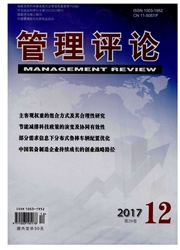

 中文摘要:
中文摘要:
本文以2000—2007年沪深上市公司为样本.从投资的构成与分布状况、大股东控制对投资行为的影响效应、成长能力与投资行为的关系三个方面研究了上市公司的投资行为特征。主要结论是:(1)上市公司不同年度的投资水平存在一定差异性,并且维持投资水平的比重较小,而增量投资水平占据主体。(2)大股东的性质对投资行为具有重要的影响.法人股控制上市公司的投资规模相对较小.而国家股和民营控制上市公司的投资规模相对较大。(3)大股东的持股比例越大,就越能够通过控制权来决定上市公司的投资决策,第一大股东的持股比例与增量投资水平之间存在正相关关系。(4)成长能力对投资行为具有重要的影响效应,中成长性公司和高成长性公司的平均投资水平要高于低成长性公司,反映了这些公司具有较高的投资机会。最后.本文对该领域未来研究方向进行了展望。
 英文摘要:
英文摘要:
Using the companies listed in Shanghai and Shenzhen Securities Exchanges during 2000-2007 as samples, this paper studies the investment behaviors typical of listed companies from three angles: the component and distribution of investment, the effect of the control of major shareholders on investment, and the relationship between growth ability and investment. The results show that the investment size of listed companies varies from year to year, and compared with the small number of listed companies that maintain the size of their investment, a large number or majority of listed companies increase their investments. The results also show that the nature of major shareholders has an important effect on the investment, and the investment size of listed companies controlled by legal person shares is small, while the investment size of listed companies controlled by state and private shares is large. Further more, the paper suggests that there is direct ratio correlation between the share of major shareholders and new investment, and the more shares major shareholders hold, the larger influence they have on the investment decision of listed companies. Finally, this paper shows that growth ability has a important influence on investment behavior of listed companies, and the average investment size of middle and high growth companies is larger than that of low growth companies. In addition, this paper also proposes a direction for future researches in the relevant areas.
 同期刊论文项目
同期刊论文项目
 同项目期刊论文
同项目期刊论文
 期刊信息
期刊信息
